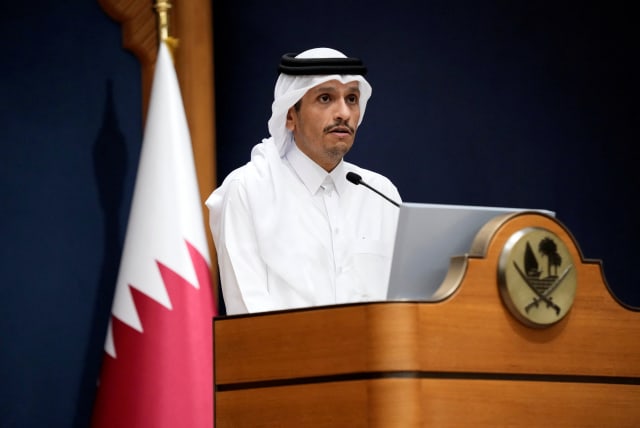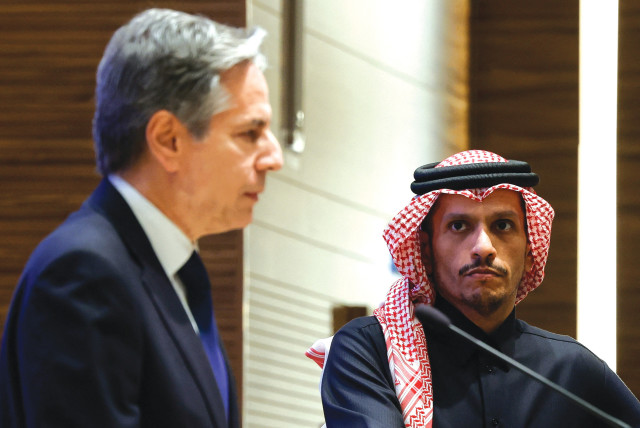Qatari PM speaks to US envoy McGurk on Gaza hostages after Iran visit

Qatari PM Al Thani met with US envoy McGurk to discuss Gaza ceasefire and hostage negotiations following his Tehran visit.
Qatari Prime Minister Mohammed Al Thani met with US special envoy Brett McGurk about Gaza hostages and regional issues after he visited Tehran on Monday, a US official confirmed to The Jerusalem Post.
“Topics included the ceasefire and hostage release deal, as well as regional issues following the Prime Minister's visit to Iran,” the official said of the Tuesday meeting in Doha.
Al Thani has been instrumental in the talks for the release of the remaining 108 hostages and to end the ten-month Gaza war.
The Qatari Prime Minister was in Tehran on Monday, in the aftermath participating in Sunday’s high-level US-led Cairo summit on the Gaza hostage and ceasefire deal, which was led by CIA Director William Burns.
Egypt and Qatar with the help of the US have been the main mediators for the talks.
An Israeli negotiating team with officials from the Mossad, Shin Bet, and the IDF are expected to join working-level talks scheduled for Doha on Wednesday.
The US has hoped that a Gaza ceasefire deal would prevent retaliatory attacks against Israel by Iran and its proxy Hezbollah, which Washington fears could spark a regional war.
Newly installed Iranian Foreign Minister Abbas Araghchi told Al Thani in Tehran on Monday, that the Islamic Republic would back any Gaza ceasefire deal that Hamas agreed to.
Iranian President Pezeshkian gives hint
Iranian President Masoud Pezeshkian appeared to hint on Tuesday, the day after his meeting with Al Thani that the Islamic Republic might be open to reviving talks with the West on its nuclear program, according to a report in the Associated Press. Such talks have been dormant for two years.
The United States on Tuesday, however, made multiple public statements warning that it still feared a direct Iranian attack was possible and that it was prepared to help defend the Jewish state, as it did in April when Iran last attacked.
US National Security Communications Advisor John Kirby told Israel’s Channel 12 "We believe that they [Iran] are still postured and poised to launch an attack should they want to do that, which is why we have that enhanced force posture in the region," he said.
"Our messaging to Iran is consistent, has been, and will stay consistent. One, don't do it. There's no reason to escalate this. There's no reason to potentially start some sort of all-out regional war. And number two, we are going to be prepared to defend Israel if it comes to that,” he said.
Pentagon spokesperson Maj.-Gen. Patrick Ryder told reporters in Washington on Tuesday that “The Department of Defense continues to closely monitor the situation in the Middle East and take steps to mitigate the possibility of regional escalation by Iran or its proxies.
“The department's recent adjustment to the US military posture in the region has enabled us to bolster US force protection, increase support for the defense of Israel, and ensure the United States is prepared to respond to various contingencies,” Ryder said.
“We remain intently focused on de-escalating tensions in the region, while also remaining focused on securing a ceasefire as part of a hostage deal to bring all of the hostages home and end the war in Gaza,” he explained.
Reuters contributed to this report.
Jerusalem Post Store
`; document.getElementById("linkPremium").innerHTML = cont; var divWithLink = document.getElementById("premium-link"); if (divWithLink !== null && divWithLink !== 'undefined') { divWithLink.style.border = "solid 1px #cb0f3e"; divWithLink.style.textAlign = "center"; divWithLink.style.marginBottom = "15px"; divWithLink.style.marginTop = "15px"; divWithLink.style.width = "100%"; divWithLink.style.backgroundColor = "#122952"; divWithLink.style.color = "#ffffff"; divWithLink.style.lineHeight = "1.5"; } } (function (v, i) { });

